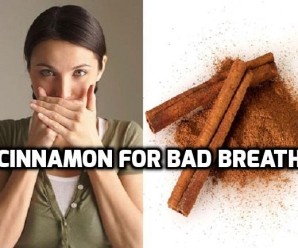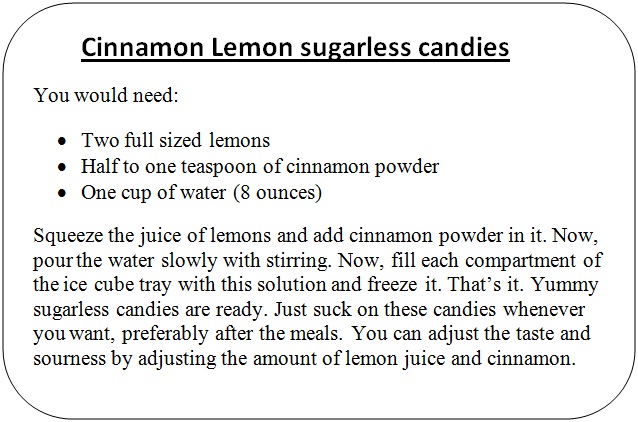
Cinnamon for Bad Breath: Herbs for Bad Breath
Cinnamon, being a natural breath freshener, is widely used as a flavoring agent in chewing gums, mouthwashes and toothpastes. Cinnamon sticks have been used traditionally as a natural toothbrush. People would just chew on cinnamon sticks to keep their teeth healthy and strong. Before discussing the benefits of cinnamon for bad breath, let us discuss the basics of oral health and bad breath.
Bad breath, also known as halitosis, is a matter of personal health and hygiene. More than 20% of the whole world’s population is suffering from bad breath up to some degree. It can cause social embarrassment and isolation to hit your confidence level. Also, if left untreated, it can result in serious dental problems.
Reasons for Bad Breath
- Poor oral hygiene– Poor oral hygiene is certainly the most prominent reason for bad breath. When you skip brushing your teeth and floss them, the food particles remain in the mouth to cause bacteria build up. These bacteria feed on these food particles to produce unpleasant gases. Moreover, the accumulated food particles themselves decompose slowly to cause bad breath.
- Dental problems– Various dental problems like tooth decay, cavities, gum problems make a suitable environment for the bacteria to grow and develop.
- Dry mouth– The saliva in your mouth performs a few vital functions- hydrates your mouth, aids in digestion and eliminates the odor causing bacteria and food particles. The problem of dry mouth- lack of saliva production- make the things worse if you have bad breath. Things that can cause dry mouth are- salivary gland diseases, breathing through the mouth (such as snoring) and certain medications (like aspirin, diuretics, non steroidal anti-inflammatory drugs, antidepressants).
- Excessive acidic oral pH– Highly acidic oral environment promotes bacteria proliferation. Bacteria simply loves acidic environment. Prolonged acidic oral pH would force the loss of calcium deposits from tooth enamel to cause tooth decay. Consumption of highly acidic foods and drinks is the main reason for acidic mouth. It includes alcoholic drinks, beer, canned fruit juices, carbonated sweetened beverages, coffee, tea, vinegar, syrup, sauce, beef, pork, packaged meat, processed foods rich in sugar and refined white flour.
- Strong odorous foods and drinks– Foods like garlic and onions contain sulfur compounds which can produce a temporary unpleasant smell. Same is the case with strong smelling drinks like alcohol and coffee.
- Smoking and tobacco chewing– Regular smoking and chewing tobacco can cause teeth staining, tooth decay and bad breath.
- Certain medical conditions– Sometimes, even if your oral health is fine, you can develop bad breath due to problems related to your respiratory system, liver or kidney. For example, chronic bronchitis, throat infection, sinus infection and diabetes can develop bad breath.
- Unhealthy gut– A healthy gut implies a healthy body. If you have imbalanced gut flora- the ratio between good bacteria and bad bacteria is disturbed- then, you would face problems like indigestion, constipation and accumulation of body wastes. Such a scenario is quite suitable to the growth of oral bacteria to develop bad breath.
- Weight loss program– Sometimes, during dieting, your digestive system would break down the accumulated fats to develop a fruity odor. Don’t confuse “fruity” odor with fresh breath. Here, we are talking about fruity unpleasant odor.
- Pregnancy– Pregnancy related symptoms such as morning sickness (vomiting and nausea), dehydration and hormonal changes can cause temporary bad breath.
Do you have bad breath
Bad breath is a quite a sensitive issue and sometimes, you remain in doubt about it. So, try these easy self tests to check if you suffer from bad breath:
- Lick the inside of your wrist, let it dry for some time and then sniff it.
- If you have a coated tongue, then just scrape the tongue a little and smell the coating.
How to reduce bad breath
- Improve the oral hygiene
Brush your teeth twice a day for two minutes each followed by flossing. A lot of people avoid flossing because it is time consuming. But, it is important to floss at least after the dinner because it removes the stuck food particles from areas where the toothbrush can’t reach.
The American Dental Association recommends changing the toothbrush after every 3 to 4 months.
Without tongue cleaning, oral hygiene is incomplete. Almost 80 to 90% of the bad breath bacteria reside on your tongue. Hence, every time you brush your teeth, just use a tongue scraper to get rid of the tongue coating. Otherwise, you can use a toothbrush with inbuilt tongue cleaner on the backside of the toothbrush head.
Develop a habit of rinsing your mouth well with water after every meal to eliminate food particles stuck around the teeth or gums.
If you wear dentures, make a schedule to clean them every day without fail.
Visit your dentist every 6 months for routine check up and cleaning.
- Drink more water
Drinking more water throughout the day would ensure optimum saliva production to reduce the problem of dry mouth. People with bad breath experience very strong morning breath because the night sleep intensifies the problem of mouth dryness. To tackle it, rinse a few times with water and then drink a few cups of water to hydrate the mouth.
Sucking on sugarless candies, preferably after the meals, also stimulates saliva production.
- Increase oral pH
Consume highly acidic foods and drinks in limited quantities to avoid highly acidic mouth pH. Also, rinsing your mouth with lemon water can quickly reduce the acidic pH because lemon water is rich in alkaline minerals which can make the oral pH alkaline.
Just squeeze a full size lemon in one cup of water and rinse your mouth with this solution every time you eat or drink something highly acidic.
- Improve the gut health
Make suitable changes in your diet and lifestyle to improve the gut health.
> Avoid overeating. Maintain regular meal timings and never skip meals as well. Eat the food slowly by chewing well.
> Limit the consumption of unhealthy processed foods rich in sugar, refined white flour, salt and saturated fats.
> Consume whole foods rich in dietary fibers such as whole grains, brown rice
> Avoid packaged/ canned fruit juices. Rather drink home made fresh juices made from green vegetables and fruits
> Avoid carbonated sweetened drinks. Limit all foods and drinks rich in artificial (white) sugar.
> Eat fermented foods rich in probiotics (healthy bacteria) – yogurt, buttermilk, kefir, kimchi, natto.
> Avoid drinking chlorinated water. It kills healthy bacteria. Use a good water filter.
> Avoid the use of antibiotics. They also kill the healthy bacteria from your gut.
> Avoid a sedentary lifestyle. Include regular physical workout in your daily routine.
- Avoid smoking and chewing tobacco
- Limit the consumption of strong smelling foods and drinks- alcohol, coffee, onions, garlic and some spices.
If no significant improvement is observed with all the above remedies, consult a physician to identify the particular medical condition which is causing bad breath.
Cinnamon for Bad Breath
Cinnamon is a natural breath sweetener with potent antimicrobial properties. It not only freshens your breath, but eliminates the bad breath bacteria as well.
The essential oils in cinnamon sticks contain a chemical compound- cinnamaldehyde- which has a strong antimicrobial action on the oral bacteria.
- According to a research study published in the Journal of Pharmacy Research, Vol 2, 2009- cinnamon has anti-microbial properties against the bad bacteria residing in the human mouth.
- A research study conducted at the College of Dentistry, University of Illinois, Chicago, USA observed that chewing a cinnamon based gum (of a reputed brand) for 20 minutes reduces the oral bacteria by half.
- Another study conducted at the Amity Institute for Herbal Research and Studies, Noida, India observed that cinnamon oil has stronger antibacterial properties than clove oil against the bacteria responsible for tooth decay.
Cinnamon is a better breath freshener than Mint
Cinnamon is better than mint in reducing bad breath because mint doesn’t possess any antibacterial properties. It just masks the bad smell temporarily.
A research study published in the International Journal of Food Science and Technology, Aug 2007 concluded that cinnamon extracts at 1% concentration has potent bacteria inhibiting properties while mint extracts exhibit negligible antibacterial properties even at 3% concentration.
How to use Cinnamon for Bad breath
- Chew the cinnamon sticks– Simply chewing on a cinnamon stick would release the essential oils that kills oral bacteria. Also, the chewing process would stimulate saliva and fresh the breath. You can chew cinnamon sticks whenever you want, preferably after brushing (and flossing) your teeth.
- Suck on the cinnamon lemon sugarless candies– Lemon juice is amazing for oral health. It neutralizes oral acidic pH, provides a citrus refreshing flavor and moreover, aids in digestion to improve gut health.
- Homemade cinnamon lemon mouthwash– Using a mouthwash after brushing is a good idea to improve oral health. This all natural and easy to make mouthwash can be a good substitute to the conventional chemical ridden mouthwashes. The recipe is as below:
- Two full sized lemons
- One teaspoon of cinnamon powder
- Half teaspoon of baking soda (optional)
- One cup of warm water (250 ml)
Baking soda is a folk remedy to whiten the teeth and adjust oral pH.
Squeeze lemon juice and mix cinnamon powder and baking soda in it. Now, pour the warm water slowly with stirring to make a perfect solution. Transfer this solution in an air tight bottle and keep it in the fridge for future use. Just shake it well before use and try to consume this solution within a period of two weeks. Rinse your mouth with this mouthwash after brushing and after the meals also.
Read more: Lemon for Bad Breath
- Homemade cinnamon extract mouthwash– Dip 5 cinnamon sticks in one cup of drinking water and boil it for 10 minutes. Strain the extract solution and let it cool to normal room temperature. Your cinnamon extract mouthwash is ready.
From where to buy Cinnamon
You have to check the nearby herbal/ super store to get some Cinnamon sticks or powder. Otherwise, buy it from Amazon:
Cinnamon sticks
If you are from USA, click here to check
If you are from UK, click here to check
If you are from India, click here to check
Cinnamon powder
If you are from USA, click here to check
If you are from UK, click here to check
If you are from India, click here to check
References
https://en.wikipedia.org/wiki/Cinnamon
https://en.wikipedia.org/wiki/Halitosis
http://www.colgate.com/en/us/oc/oral-health/conditions/bad-breath/article/how-to-tell-if-you-have-bad-breath-0615
http://www.ada.org/en/member-center/oral-health-topics/toothbrushes
http://www.ada.org/en/about-the-ada/ada-positions-policies-and-statements/statement-on-toothbrush-care-cleaning-storage-and-
https://www.ncbi.nlm.nih.gov/pmc/articles/PMC4003790/
http://jprsolutions.info/files/final-file-56b2e9f4a8bc48.10368858.pdf
https://www.ncbi.nlm.nih.gov/pubmed/22783715
https://www.researchgate.net/publication/227703936_Evaluation_of_antibacterial_activity_of_Indian_spices_against_common_foodborne_pathogens
https://www.ncbi.nlm.nih.gov/pubmed/21290983



